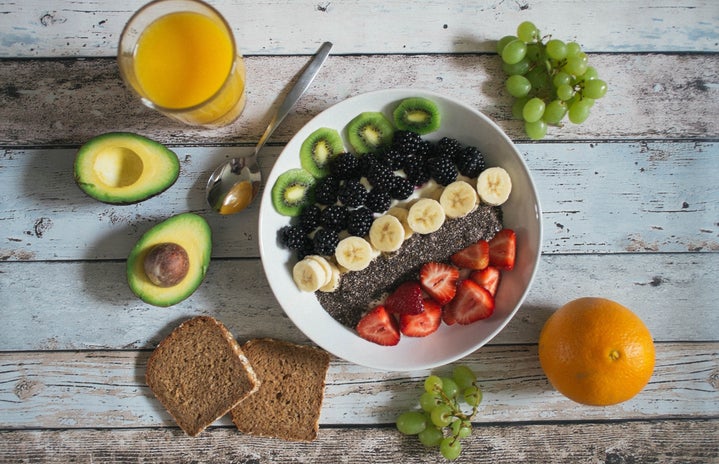From the sharpened knife to the burning hot stove, cooking can be pretty intimidating but cooking is an essential life skill to have, especially for college students. Yes, you can easily get takeout, but that costs more money than cooking your own food. When cooking, you know you always have the freshest ingredients and it ends up being healthier, more nutritious, and cheaper in comparison to fast food meals. And no, cooking is not microwaving frozen dinners. Although I am not a professional cook, I have been cooking for about 8 years now and I am here to share some tips that will save you from cuts to burnt food.
1. When cutting vegetables or meat, hold your knife tightly near the blade and use your other hand to hold the ingredient. When you are holding the ingredient, tuck your fingers in (see picture below). This ensures that you won’t cut your fingers and make sure your ingredients won’t slide as you are cutting.
Photo by Marshall Gordon/Cole Group/PhotoDisc
2. Always have your knives sharpened! A lot of people believe dull knives are safer, but dull knives actually increase the risk of more cuts because the dullness causes slippage as you are trying to cut the ingredients. A sharp knife cuts through ingredients effortlessly and cleanly. You can buy knife sharpeners on Amazon for $6.
Photo by Amazon.com
3. Always have your ingredients prepared before cooking. This makes it easier and more efficient than chopping your ingredients one at a time and then cooking it. Fun fact: in French, it means mise en place.
Photo by Pixibay
4. Watch YouTube videos for guidance. I started cooking because I watched Food Network and learned valuable tips from these experienced chefs. If you are a visual learner, it may be easier to see the step-by-step processes in action. I recommend the Bon Appetit channel; the chefs have personality and the recipes are easy to follow.
5. To get the perfect sear on that chicken, heat up your pan before you put the oil in. Then, after the pan is heated, pour the oil onto the pan and wait for it to heat up. To test whether. the pan is ready, wet your hands a little and flick some water on the pan. If you hear a sizzle right away, that means the pan is ready for cooking! If your pan is smoking, take the pan off the heat and wait for it to cool down to avoid burnt food.
Photo by Brandless on Unsplash
6. Always check on your meat, especially if it’s chicken and pork! You don’t want to risk getting salmonella. For chicken and pork, make sure the meat is cooked thoroughly and the middle is not pink. As for red meat, it is okay for the meat to be pink in the middle; it just depends on how you like your steak. Cut the meat in the middle to check; it won’t matter much because you are going to cut the meat anyways.
Photo by José Ignacio Pompé on Unsplash
7. Mincing an onion can be difficult and time-consuming to chop. An easy way to cut onions is to cut a whole onion in half. Then, place the onion flat-side down. Cut the onion vertically leaving the root intact (the knife is perpendicular to the cutting board). Next, cut the onion horizontally, slicing through the onion (the knife is parallel to the cutting board). Lastly, rotate the onion where the root is on the left (right, if you are left-handed) and chop the onion, like you are chopping vegetables. For my visual learners, see the gif below!
Photo by Giphy
8. If you are new to cooking, cook with friends who have experience. Cooking with others is more fun than cooking by yourself. If you’re trying to get the hang of it, what’s a better way than learning from others? Also, you get to bond with your friends and make new memories!
Photo by Pixibay
9. Taste your food! Just because you followed the recipe exactly, it does not mean that it may taste good. By tasting the food, you can adjust accordingly by adding more spices or salt. Also, everyone has different taste buds and it is up to the cook for the final touch. No one wants bland food!
Photo by Unsplash
Learning new skills always requires practice. After all, practice makes perfect. Don’t be disappointed or discouraged when your first dish does not come out correctly if it is your first time cooking, be proud that you completed a dish! With hard work, comes reward (the yummy, delicious food)! Cooking can be fun, but only if you make it out to be fun.


